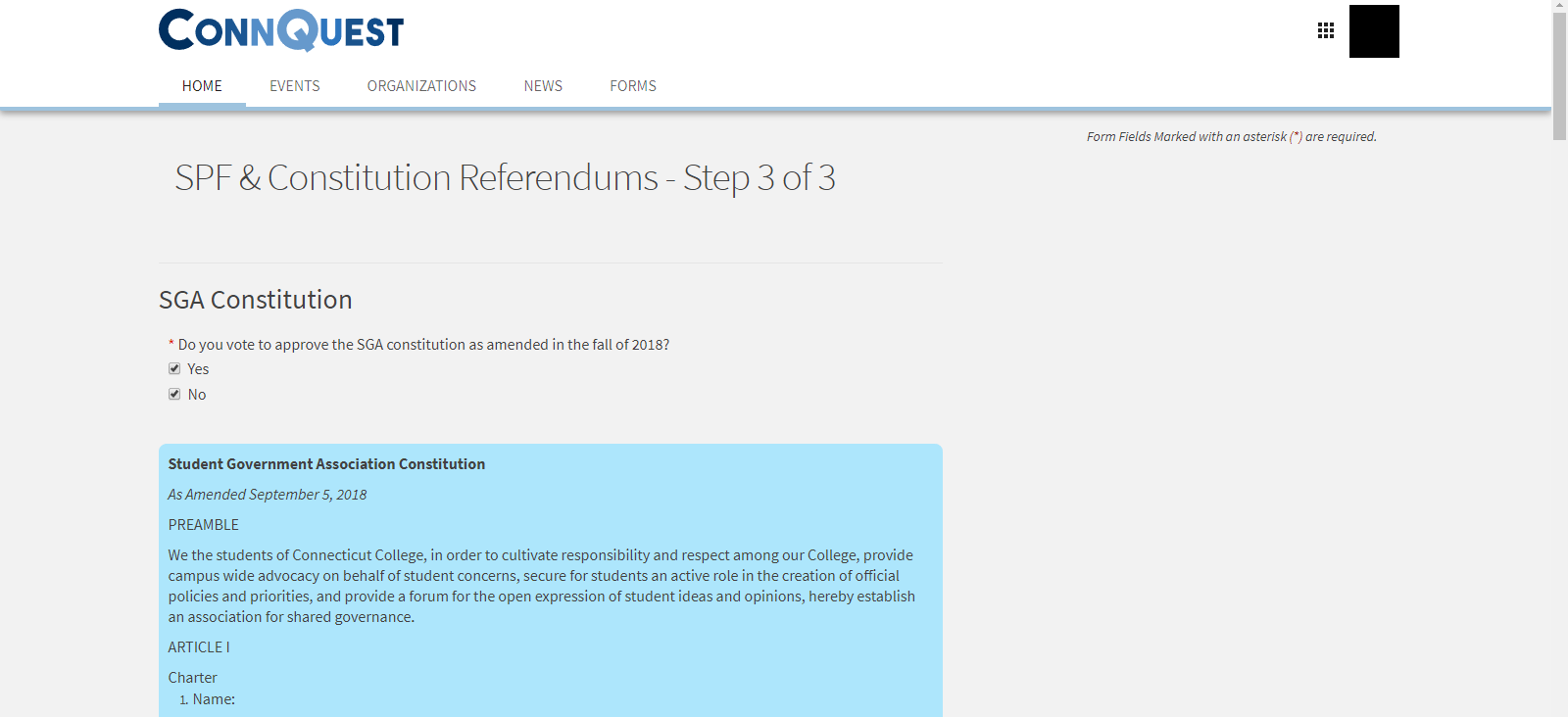Two referendums held in November regarding SGA’s constitution and Sustainable Projects Fund have passed successfully, according to SGA communications chief Nadia Bednarczuk ‘19. The constitutional amendments included updates about elected position definitions and stipulated that certain SGA rule-creation power should be controlled by their bylaws, rather than the constitution. The SPF renewal continues a sustainability fund voted on by the student body every three years that draws $25 from every student’s tuition.
While both ballot questions passed by an overwhelming majority of those who voted, just over 20% of the student body actually participated in the election. That barely met the participation threshold of 20% applied by SGA to this election, which was extended at one point because less than 20% of the student body had cast ballots.
The SGA constitution itself requires a constitutional amendment referendum to be “well publicized in advance by the Chief of Communications.” But SGA did not send any official all-campus communications about the referendums in advance of the election going live. SGA Parliamentarian Morgan Fowle ‘19 noted that SGA house senators, who represent dorms and independent living communities on campus, mentioned these elections in emails prior to ballot distribution. Fowle also said SGA had multiple tabbling sessions where people could ask questions about the measures.
The election had actually been live for at least two days before SGA even sent its first official communication of the election — which was a link to the digital ballot itself. The email contained information about the SPF election, but did not refer to specifics on the constitutional amendment question. When voters arrived at the constitutional amendment question on the ballot, specific changes were not outlined. Rather, the ballot displayed the entire text of SGA’s revised constitution.
Fowle said that the biggest goal was making the constitution consistent with existing bylaws. Amended sections included those focusing on executive board positions and the constitution’s relationship to SGA’s bylaw document.
One amendment altered the list of executive board positions to reflect a resolution passed by the assembly in Spring 2018 that removed the position of Student Activities Council chair from SGA’s executive board. The document also now defers succession processes for positions like SGA President to the assembly’s bylaws. Changes to bylaws require a vote in the assembly, while constitutional amendments require campus-wide referendums.
Fowle, who is responsible for facilitating SGA meetings and helping to maintain SGA documents like the constitution or bylaws, says the executive board is planning to introduce updated bylaws early next semester. That means that procedures such as the succession of a SGA President following resignation or impeachment would be decided upon by the assembly itself through an approval of new bylaws.
While the constitutional ballot question did reflect these changes, the ballot did not make clear what was a change and what had been there before.
That question caused more confusion among some students because the constitutional amendment question allowed students to vote both for and against the measure. “Yes” and “No” response options were displayed with “checkboxes,” a digital form question type that allows multiple answers.
Bednarczuk says four students’ votes were deemed invalid because they responded with both answers. SGA’s constitution and bylaws do not cover ballot design errors, but they do reference the possibility of an invalid election. Fowle said that the four students’ votes being disqualified didn’t change the result, but that the checkbox mistake might warrant more serious consideration if it “had come to impact the election in any way.”
The SPF ballot question did not have the same issue. It had “radio” buttons, a digital form question type that allows a respondent to provide only one answer. There is no constitutional requirement to publicize the SPF referendum in advance, but house senator emails indicate a higher level of detail regarding this measure. The ballot distribution email from SGA also provided specific notes on the SPF and what changes were made from the SPF last approved in 2015.
SGA sustainability chair Maggie Newell ‘19 says the two questions were unrelated, but were packaged together for convenience. The renewed SPF will now support a roll-over fund, and also provides more oversight over recurring SPF-funded projects.
The SPF renwall ensures a critical source of SGA-funded projects remains active. In recent years, the SGA has passed SPF-related resolutions to fund waste disposal, food service, Floralia preparation, conference attendance, and more. Newell says upcoming SPF-related efforts will focus on composting, recycling signage and more. •










